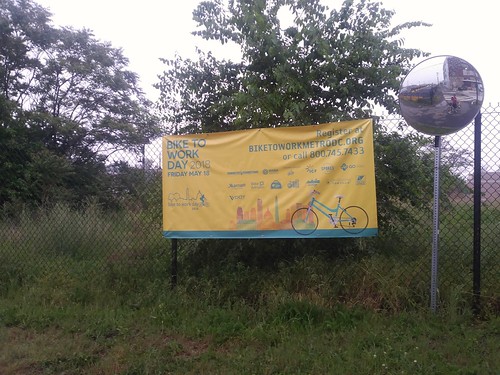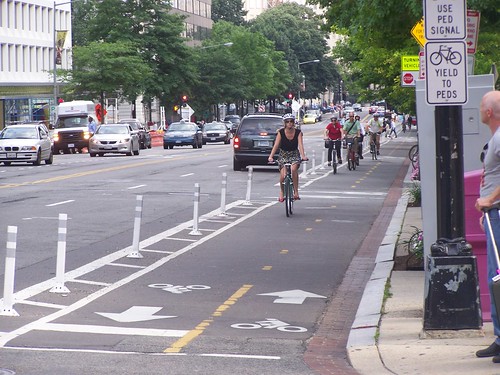May is National Bike Month and tomorrow is Bike to Work Day in the Washington region
 I have been remiss in writing about National Bike Month, with the aim of writing a bunch of "reflective" pieces, book reviews, etc. My aims about writing are always greater than what is realistically achievable.
I have been remiss in writing about National Bike Month, with the aim of writing a bunch of "reflective" pieces, book reviews, etc. My aims about writing are always greater than what is realistically achievable.Tomorrow is Bike to Work Day in the Washington area.
The last couple years I've written a couple pieces using Bike to Work Day as a goad to explore where we are and where we need to go with bike planning. Last year's pieces were:
-- "Bike to Work Day as an opportunity to assess the state of bicycle planning: Part 1
-- "Bike to Work Day as an opportunity to assess the state of bicycle planning: Part 2, building a network of bike facilities at the regional scale
Probably these recommendations need to be reorganized. The second piece should make some mention of infrastructure too, not just facilities, which I define as the support infrastructure for biking (parking, air, repair, etc.) as opposed to lanes and trails. And the first piece should have more overarching recommendations, along the lines from these past entries:
-- "What should a US national bike strategy plan look like?, 2014
-- "Are developers missing the point on eliminating parking minimums?: it's to promote sustainable transportation modes," 2012
-- "More bikes: elements of a Bicycle Friendly Community," 2015
Not included here, the first BTWD piece includes links to a number of best practice bike planning publications.
In the first piece, I made these recommendations:
1. From Bike to Work Day to Bike Month. Here my concern is too much focus is on "the day" and not enough on creating a wide range of activities that promote biking as transportation throughout the month. Such as Bike to School Day on May 9th, which I neglected to mention as it happened.
2. Transit agencies should have a set of model practices for participating.
 3. In the DC area specifically, there needs to be greater focus on the opportunities to work with large employers, especially the federal government, and college campuses.
3. In the DC area specifically, there needs to be greater focus on the opportunities to work with large employers, especially the federal government, and college campuses. 4. Bike Month should be used as the "launch month"/target date for the launch of new infrastructure and facilities, and bike map reprintings.
5. Sustainable mobility street closure event. Every major metropolitan area should have open streets events. In the US, CicLAvia in Los Angeles County is the most successful.
6. There should be a bike/sustainable mobility expo during National Bike Month.
7. (revised slightly) All metropolitan areas should develop a metropolitan bikeway network. In the DC area, the Capital Trails Coalition should be organized as a formal function of the Metropolitan Planning Organization.
8. Membership for the League of American Bicyclists and local and state bike advocacy groups should have special pricing during Bike Month.
9. Special pricing for subscriptions to biking magazines like Bicycling, Momentum, Bicycle Times, etc. should be offered during Bike Month.
The second piece focuses specifically on the creation of a metropolitan scale secure bike parking network that is cross-jurisdictional and it has a number of items which will be addressed in a second piece.
But here are some items to add to the first list:
1. Transportation departments need to take a more active role in promoting biking as transportation, with more and specific programs and initiatives designed to support people through the transition. Many communities in the UK have programs where people can use a bike with helmet and lock for up to a month for a low fee (or free) to test biking for transportation without having to first buy a bike.
2. This should include systematic initiatives to increase bicycling for transportation usage with specific demographics. See "Eight "mutual assistance programs" that can build support for biking as transportation on the part of low income communities."
3. If we really want to promote reductions in car usage, let's get serious. Paris is now providing incentives to buy bikes, cargo bikes, and e-bikes as a car reduction strategy ("Paris to offer subsidies to those who buy bikes, give up cars," Smart City Dive).
 4. There need to be systematic initiatives to increase bicycle access for the disabled ("You can rent tricycles, tandem bikes in Detroit: Here's how," Detroit Free Press). Unlike the new Detroit program, I think these programs should be offered at no charge, using various programs in the UK, such as All Ability Cycling clubs as a model.
4. There need to be systematic initiatives to increase bicycle access for the disabled ("You can rent tricycles, tandem bikes in Detroit: Here's how," Detroit Free Press). Unlike the new Detroit program, I think these programs should be offered at no charge, using various programs in the UK, such as All Ability Cycling clubs as a model.5. Bike sharing programs should offer special promotions for National Bike Month and Bike Work Day. For example, the MoGo program in Detroit is offering free rides on May 23rd, the program's one year anniversary.
6. Licensing for dockless bike share should include requirements for participating in transportation demand management programs, National Bike Month, Bike to Work Day, and other activities.
And maybe there needs to be a list of national recommendations.
1. The first would be the creation of a National Bike Strategy, as is the case in many countries. Here's Denmark's Denmark - on your bike! The national bicycle strategy.
2. The second would be requirements for lights, including turn signals, on OEM bikes made for transportation use (hybrids, etc., not mountain bikes and racing bikes).
Labels: bicycle and pedestrian planning, car culture and automobility, sustainable mobility platform, transportation demand management, urban design/placemaking



2 Comments:
The boston bike share program provided free rides on btwd:
http://beaconhilltimes.com/2018/05/17/blue-bikes-unveil-new-design-announce-free-ride-day-on-may-18/
Ranchi City in India is launching dock based bike share. The inaugural launch will include a 4.5km "Cyclothon" as one of the promotional events.
https://www.telegraphindia.com/states/jharkhand/go-green-join-the-4-5km-cyclothon-organised-by-chartered-bikes-for-free/cid/1685762
2/27/2019
Post a Comment
<< Home